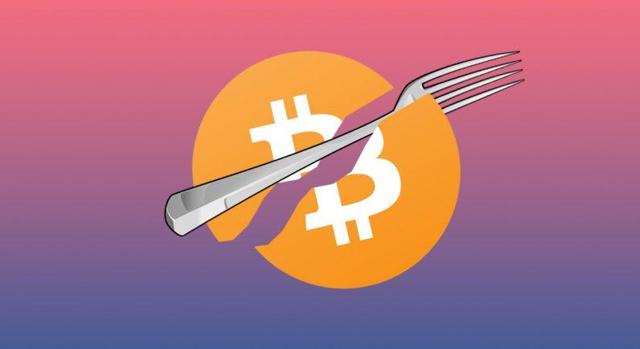Forks Will Put A Knife In Bitcoins Heart
Richard Gordon
Summary
• One of Bitcoins most notable differentiators in the crypto space is it has no central governance (unlike Ethereum, Ripple and many others).
• Together we will examine how this affects Bitcoin and whether it leaves it better off or worse off compared to others in the space.
• We will then look down the road to potential results of our conclusions and determine which crypto is best to put our money into.
Intro
In my most recent article regarding the crypto-sphere (found here), I gave an introduction to one cryptocurrency I thought was a surefire long-term hold (XRP/Ripple), and examined how it was different from other cryptocurrencies. In this article we will examine Bitcoin, Ether and Ripple further to see how the differences between the latter and Bitcoin can help us make the best investment.
Bitcoin
As mentioned above, one of the things that makes Bitcoin so interesting is that from the get-go when it was first released and made public, it had nobody "in charge". It was completely decentralized in use and in governance. In fact, it is still unknown who made Bitcoin (or if it was one or multiple people). Recently, a SpacEx intern posted on medium his theory that it was Elon Musk, causing the Tesla (TSLA) CEO to publicly deny the claim.
Ethereum
This is in stark contrast to Ethereum, which has a designated "founder" (Vitalik Buterin) as well as a host of other people leading various parts of the project. Additionally, there is the Enterprise Ethereum Alliance which is a group of dozens of companies ranging from start-ups to fortune 500 companies like Intel (INTC), JPMorgan (JPM) and Santander (SAN). It is interesting to note that many Bitcoin enthusiasts in the early days of Ethereum were skeptical to buy Ether due to the fact that people could control the blockchain for their own personal gain.
Ripple
Further venturing away from Bitcoins anarchist and "anti-bank" roots, we have Ripple, a full fledged company in charge of their own block chain system. Ripple has a team that is being paid to be accountable for the health of the system. They have a defined use case (enabling financial transactions to occur in 4 seconds and at a reduced cost) and a plan to get there. Before we proceed to see how these different organizational levels and agendas play out when forking becomes involved it is important to understand at least the basics of what a fork is.
What Is A Fork Anyway?

a fork in the road (Two divergent paths) (Image Source)
A fork (technically I am referring to a "hard-fork" here) can be thought of as a "fork in the road" for the blockchain. If you are traveling down a path and suddenly it diverges into two directions, you must choose which way to continue. Just like if you were walking, regardless of which path you choose the other (blockchain) still exists. It is up to you to decide which path is better based on if you think the path you have been on is better or if you want to continue down a different route instead.
In the blockchain world, a fork is exactly like this, although harder to comprehend because it is completely digital. The blockchain is essentially a computer program. The same way any file can be copied, edited and then saved as a revision with the first still existing, so can a blockchain.
So when someone or a group of people (whether the bitcoin mining community, Vitalik Buterin and Co., Ripple the company or whoever has a voice about a certain blockchain) decides to implement a change (generally regarded as an improvement) to their blockchain, they merely decide a date or transaction number to implement the change at, and everybody then switches to the "copied and editied" file or clone of the one that was being used up until that point. This is all simple enough, until you examine the different results that can occur with various levels of leadership.
Ripple

(Image Source)
When Ripple decides to implement a change to their blockchain it is easy enough. They just push the changes to their repository hosting the files and they are basically done. In fact, Ripple just "Forked" there technology this week with a minor update from version 80.0 to 80.1.
Then those participating in the network must vote on amendments and once a majority has reached consensus the change is implemented. More information on amendments can be found here. Luckily, since Ripple is a company and has relationships with their clients, they can also help to ensure everyone comes on board to implement the changes when necessary. The old blockchain can then be discarded and although it still "exists" it is basically defunct, deprecated and not maintained or utilized after that.
Ethereum
Ethereum is quite similar to the process for Ripple. The leadership announces a fork (transaction number and approximate date) and the entire community follows suite and adopts the new duplicated block with the implemented changes. These changes are always in line with things the Enterprise Ethereum Alliance wants and in general are slowly but surely improving the platform until it achieves the stated vision from the white paper.
The first time Ethereum tried to implement a hard-fork to fix some major flaws with the system, there was a resistant group of miners. They claimed that the Ethereum blockchain should never be changed and that they would continue support for the"original" Ethereum blockchain protocol. Since the majority of the community still supported the changes, the new chain retained the name "ETH" for the token and the old token/blockchain was changed to Ether Classic (or ETC). This shows some of the issues with the mining system Bitcoin is built on and Ethereum currently utilizes, with miners having a big influence on the transitions. But what about when the only people with any say are the miners?
Bitcoin

With Bitcoin forks, anyone who has been following them knows they can get messy. Many of the diehard Bitcoin fans believe the blockchain should never be altered (as those with the ETC backing). Many miners (who are ultimately mining in order to make money, with entire warehouses dedicated to the cause in Asia) also will promote whichever change they think they can get the highest returns with. Many people investing in Bitcoin today don't even understand the technology.
The lack of governance, control by those with profit motivated interests (for themselves) and polarized views about what is "best" for Bitcoin cause for a lot of issues in the community.
To date, Bitcoin has undergone 2 hard-forks with a 3rd highly-controversial fork indefinitely postponed at the moment. The problem with the forks is that unlike with XRP/Ripple and Ethereum/ETH, Bitcoin's community is too polarized to agree to adopt any of the changes implemented 100%. As a result of this, neither fork was able to capture the BTC name, instead opting for the offshoots "Bitcoin Cash" (BCH), "Bitcoin Gold" (BTG) and "SegWit2X" (B2X).
This has lead many who have not understood Bitcoin to begin with to be unsure of which is "the real bitcoin" and a lot of confusion in the media and community.
While many of the changes are good changes (like implementations to improve transaction speed or reduce mining costs) the fact that no central leadership can steer the technology in the correct direction is causing for a lot of issues for Bitcoin.
The problem is that even if some of these changes are beneficial, if they do not achieve enough traction they ultimately may go away. For example, Bitcoin Classic, is shutting down and endorsing Bitcoin Cash.
Regulation
Another issue that all these technologies must face is increasing government scrutiny and regulation.
Bitcoin
Bitcoin will face the hardest repercussions due to its increase in adoption pressuring the government, as well as it's stance promoting an "alternative banking system" and empowering money-laundering and online drug-dealing.
This week the crypto market faced a flash crash after reaching all time highs on news that Nobel Prize Winner Joseph Stiglitz called for a ban on Bitcoin.
Ethereum
Ethereum on the other hand has many important businesses backing the technology who can lobby the government and progress the conversation on regulation in a sensible manner.
Ripple
Similarly, Ripple has a company that can interact with various governments and banks throughout the world to ensure regulation is inline with their agenda or adopt changes to their protocol that make the technology comply.
Recently, Ripple even brought in a new board member who helped draft regulations for cryptocurrencies already.
So How Does This Effect Each Going Forward?
Bitcoin
Although Bitcoin will still likely return investors money for some time to come, it is ultimately a very risk place to put your money. With uncertainty regarding what chain will ultimately be "The" bitcoin chain, and many contenders competing for the spot, it is possible the entire bitcoin craze is ended with sudden regulation by a large government or that the entire community becomes spread so thin and so polarized they all collapse.
I could even see Litecoin (LTC) taking Bitcoins throne as the "store of value" system in the cryptocurrency world due to the fact it shares the same underlying code as the original bitcoin but has better leadership and so far a smaller community.
Ethereum
Ether, while it does not really compete with Bitcoin, has much less risk due to their ongoing dialogue with governments and businesses around the world and their shift away from depending on miners. While I am not sure of the ultimate long-term value of ETH, I certainly believe it is at much less risk of becoming illegal overnight, or from polarizing the community into self-collapse.
Ripple
Ripple seems the strongest suited of the three here, with a company backing the technology, and the underlying protocol built by the Linux Foundation. Additionally, Ripple has always had the goal of compliance since they cater to banks and other financial institutions as opposed to trying to replace them.
With their recent board member addition they have only strengthened their ability to navigate government regulation.
In fact, I believe Ripple could actually benefit from regulation as it would make banks less unsure of the future legality of such a system and they would not be as hesitant to adopt the cryptocurrency XRP that can be used with Ripples product suite.
Conclusion
In conclusion it seems to me that what was one of Bitcoin's most praised traits (complete decentralized control) may end up being it's biggest weakness as the IRS and various government entities try and grapple with the currency. I see Litecoin being the biggest to benefit from this shift as the most similar thing to the various Bitcoin iterations that exist today.
Ether seems well poised to overcome any regulation due to their international dialogue with many companies and governments such as in Russia and Dubai.
Ripple as mentioned above is probably the one that most stands to benefit from clear regulation as they can then proceed in recruiting banks without fear of the law interfering suddenly.
Investor Takeaway
With Bitcoin reaching the $10,000 mark this week for the first time, Ether and Litecoin recently hitting new highs and Ripple having a considerable run-up from .22 - .27 cents in the last few days it is important to remember that the cryptocurrency market is evolving and growing quite fast. Keeping in mind how government regulation and leadership effect these various technologies can be critical for making a good decision.
With currently about 50% of the market cap of all cryptocurrencies stored in Bitcoin any major upheaval in which fork is adopted will have a huge effect on the entire crypto market.
While all of these technologies will go through several more forks in their lifetime in all likelihood, some are more suited for change than others and those that are not lead well or ready to deal with regulation may suddenly find themselves in a sinking ship.
Bottom Line
The biggest thing Bitcoin has going for it is brand awareness, but the brand is becoming extremely convoluted due to all the forks being proposed, implemented or otherwise. Bitcoin suffers major drawbacks in the underlying technology when compared to Ether, Ripple and Litecoin (among others) as well as no real entity to deal with regulation compliance or act in the technologies (or users of it) best interest.
Despite recent performance, the community for Bitcoin is fragmenting and many more viable candidates (whether a Bitcoin fork or not) are emerging. I believe there are too many risks to hold Bitcoin for the long term and would investigate Ether (ETH), Litecoin (LTC), or Ripple (XRP) instead.
0 comments:
Publicar un comentario